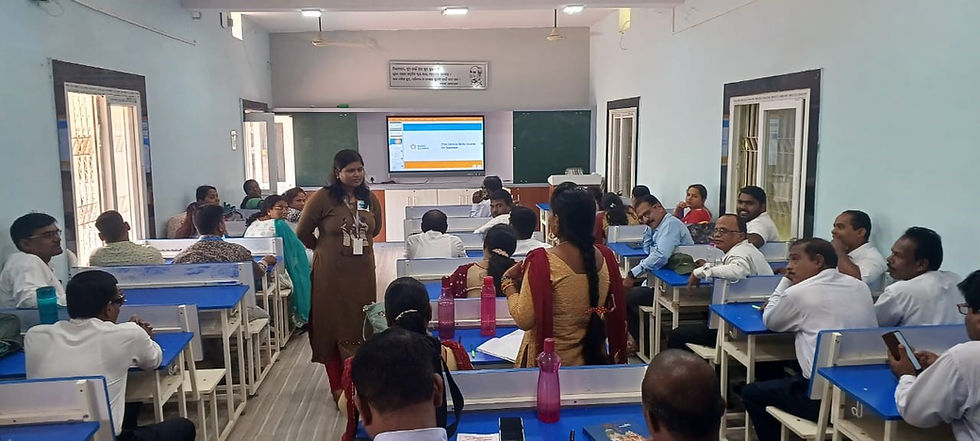Prativa using Peer Education to teach young girls and boys on Gender Equity
- Student Partnership Worldwide India Project Trust

- Jul 5, 2022
- 3 min read
Updated: Aug 23, 2023
Prativa, 26 years old is a Youth Facilitator under the Plan-It Girls programme in Deoghar district of Jharkhand. Youth Facilitators like Prativa, run sessions in Government Senior Secondary Schools in Deoghar and Pakur in Jharkhand for boys and girls aged 12-17, to promote gender equality through redefining masculinity and reflecting on inequitable gender norms and violence.

"Girls did not have any avenue where they could access accurate information and ask questions about menstruation or gender-based violence or sexual health before this programme was started".
- Prativa
Prativa Kumari, 26, was a middle school teacher in Deoghar District of Jharkhand, India, when she learned about the Plan-It Girls programme. As part of this initiative, young people from her community would be trained for taking classes with adolescent girls on topics such as identity, self-efficacy, resourcefulness and employability. “I was immediately interested in the opportunity. Teaching is something I really enjoy, and I had been taking coaching classes at home for students from grades 5 to 8 for a while. So, when one of my acquaintances told me about Plan-It Girls, I was very keen to get involved with the programme.”
Plan It Girls Program
The curriculum followed in the Plan-It Girls programme touches upon several sensitive and taboo themes including menstruation and body mapping. Initially, Prativa was anxious about how students would respond to the sessions. However, in the very first session, she discovered that her worries were unwarranted. “The girls in the school were very interested when we did the first session. In fact, it did not even feel like it was our first day. I think this
was largely because of the thorough training we had received before starting the sessions. Furthermore, the girls did not have any avenue where they could access accurate information about menstruation or gender-based violence or sexual health before this programme was started. As a result, they were very engaged with the classes.” Prativa also developed good relationships with the school teachers, who were quite excited about the
classes that she and her fellow Youth Facilitators were leading.
According to the Educational Statistics Report by the Ministry of Human Resource Development, Government of India; Girl's enrollment rate stands only 23.5% against 25.4% for boys in higher education (2015-2016). The dropout rate at secondary level education is 17% whereas at primary level dropout rate is 4%. We should also keep in mind there is a shortfall of 900,080 million teachers (2016) and the highest shortfall is in the state of Jharkhand.

Pavitra's Ground Work
For Prativa, the most challenging but rewarding part of her involvement with Plan-It Girls was engaging with community members to change their attitudes towards educating their daughters. In her district, it is fairly common for girls to drop out of school once they turn 16 and get married. “My older sister had been married off at the age of 16 and my parents also received a marriage proposal for me when I was that age. However, I was adamant about not getting married too young and pursuing my professional interests first.”
Prativa organised several door-to-door meetings with parents of adolescent girls in her district to inform them about child marriage being illegal and the psychological harm on adolescent girls, encouraging them to rather send their daughters to school. She remembers a particular instance when a girl from the school told her, that her parents wanted her to get married. “I visited this girl’s house multiple times to speak with her parents and change their minds. They were concerned that if their daughter became well-educated, they would have to pay a higher dowry to get her married.Eventually, we managed to convince them of their daughters’ potential by pointing to her excellent scores, and they agreed to enrol her in high school. She is performing exceedingly well and her parents seem to be quite happy, she still comes to me every time I visit the school. ”
Such encounters have enabled Prativa to learn how to talk to people from different backgrounds, counter challenges and become more independent. “Earlier I was just coaching students at home, but now I am reaching out to all villages in my district. People in my village know my name and they are proud of me. I think I have become a bit of a role model, and a lot of girls say that they want to become like me ‘didi’.”
In her opinion, programmes like Plan-It Girls are essential for making girls aware of their rights especially the right to education and abolition of child marriage. As a victim of gender-based violence, she stresses the importance of understanding what constitutes violence in order to be able to demand effective remedies. “Programmes like Plan-It Girls make girls self-reliant by providing them with knowledge of their rights and ensuring that they can recognise when they are being treated unjustly. Tomorrow, even if I leave the district, I
am making sure that my students have the training and knowledge to fight for themselves.”




Comments